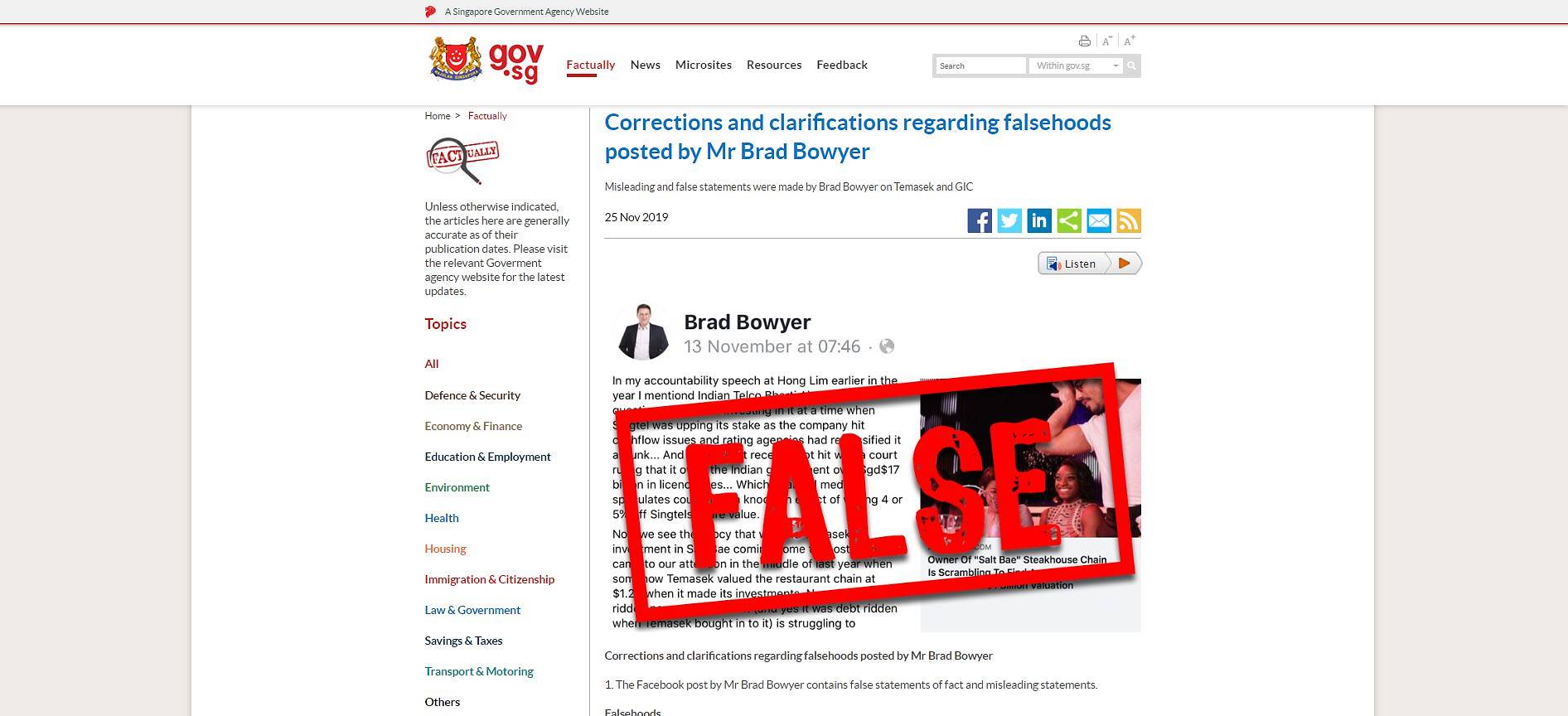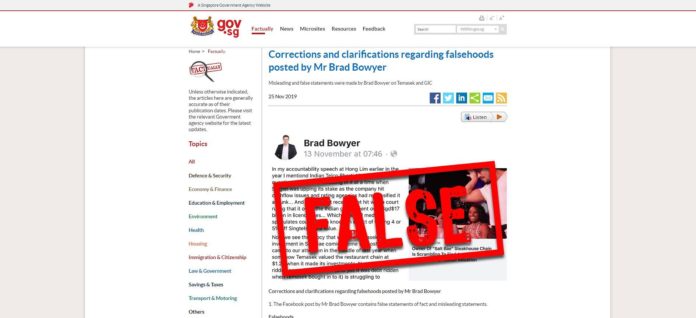SINGAPORE: Deliberate online falsehoods, National Service (NS) deaths and streaming in schools were just three of the main topics discussed in the Singapore Parliament in 2019.
Over the course of the year, more than 200 stories were published by CNA on the issues raised in the chamber.
Here is a look back on some of the issues that were debated in Parliament over the course of 2019.
DELIBERATE ONLINE FALSEHOODS

A screenshot of the Factually post citing the corrections and clarifications regarding falsehoods posted by Mr Brad Bowyer on Temasek and GIC on his Facebook account. (Image: www.gov.sg)
The Protection from Online Falsehoods and Manipulation Act (POFMA) was passed in May after a two-day debate that lasted more than 14 hours.
Designed to tackle deliberate online falsehoods, it was passed with a majority of 72 to nine, with three Nominated Members of Parliament (NMPs) abstaining.
Members of the opposition Workers’ Party voted against the Bill.
There were concerns raised by members that the definition of falsehoods might be too wide and ambiguous and have a chilling effect on people expressing their opinions.
“You put up an article, Government says this is not correct. You carry a correction (and) let your readers judge. What’s the problem? More transparency, the better,” Law and Home Affairs Minister K Shanmugam argued.
READ: FAQ: How will the new law stop deliberate online falsehoods from spreading?
Singapore has invoked POFMA four times since the legislation came into force in October.
Opposition party member Brad Bowyer was directed to correct a Facebook post in November, as was the States Times Review in the same month.
READ: Facebook issues correction notice on States Times Review’s post
In December, the Singapore Democratic Party (SDP) was asked to correct two Facebook posts and an article on its website that were related to manpower issues.
In the same month, lawyer Lim Tean was directed to add a correction notice in full at the top of two Facebook posts about the Ministry of Education’s (MOE) spending on local and foreign students.
PMDs BANNED ON FOOTPATHS
A GrabFood rider on an e-scooter. (File photo: TODAY/Najeer Yusof)
Personal Mobility Devices (PMDs) was a widely debated topic in Parliament in 2019.
The Ministry of Transport said in May there were no plans to ban PMDs on Singapore’s footpaths.
In August, it was announced that all 15 town councils run by the People’s Action Party (PAP) will ban PMDs from void decks and common corridors to increase the safety of public paths.
The Aljunied-Hougang Town Council run by the Workers’ Party said they have the “powers to deter PMDs from riding at common areas” but “enforcing these powers without evidence of an infraction is a challenge”.
READ: PMD safety certification deadline moved forward to July 2020; all e-scooters to go through mandatory inspection
READ: PMDs could be banned if rider behaviour does not improve: Janil Puthucheary
Several incidents involving PMDs, such as crashes and a rise in the number of fires involving the devices, were reported before the issue came before Parliament again.
On Nov 4, the Government announced that electric scooters will be banned from footpaths the next day, with offenders facing fines of S$2,000 and jail time of up to three months once the ban is strictly enforced from Jan 1, 2020.
E-scooters can be used on cycling paths and park connector networks, but are still banned from roads. The advisory period ends on Dec 31.
The ban will not apply to bicycles or personal mobility aids such as motorised wheelchairs or mobility scooters.
READ: E-scooter ban on footpaths: 5 things you need to know
STREAMING IN SCHOOLS
Students at Bendemeer Primary School after collecting their PSLE results in 2018. (Photo: MCI)
The current approach to streaming in secondary schools will be phased out by 2024. Under the changes, secondary school students will not be posted into Express, Normal (Academic) or Normal (Technical) streams.
“In its original form, streaming assumed that students needed a certain pace of learning in all their subjects, whereas many students, in fact, have uneven strengths across different subjects,” Education Minister Ong Ye Kung told parliament.
“More importantly, entering a stream that is considered ‘lower’ can carry a certain stigma that becomes self-fulfilling and self-limiting,” he added.
“Students can develop a mindset where they tell themselves, ‘I am only a Normal stream student, so this is as good as I can be.’”
READ: Government needs to recognise trade-off that comes from streaming students in secondary school: Ong Ye Kung
READ: Wealth tax, scrap secondary school streaming: MPs suggest measures to tackle inequality, social stratification
There is also room for specialised schools, Integrated Programme schools and schools that take in only Express students to offer more subject options at different levels, Mr Ong added.
NS DEATHS
The body of Aloysius Pang leaves for Mandai Crematorium from wake venue at Macpherson. (Photo: Jeremy Long)
The Singapore Armed Forces (SAF) renewed its emphasis on safety after the deaths of four servicemen in training over 17 months.
Senior Minister of State for Defence Heng Chee How said in March that commanders had comprehensively reviewed safety management plans and “training tempo”.
This comes after Defence Minister Ng Eng Hen told Parliament that he was “deeply sorry” for the deaths and that MINDEF and the SAF will hold themselves accountable for every NSman.
Soldiers have the right to stop unsafe training, Dr Ng added. “If you think it’s unsafe for your buddies, yourself, raise it up. If you think that someone is pushing beyond his means to physical harm, do so. I think that’s the way we maintain realistic training and give comfort to our parents.”
Actor Aloysius Pang died on Jan 23 at Waikato Hospital in New Zealand after sustaining injuries while carrying out repair work on a howitzer during his reservist duties.
In a ministerial statement in February, Dr Ng told Parliament that in addition to the Committee of Inquiry (COI), the Singapore Armed Forces (SAF) Special Investigation Branch (SIB) will also investigate the death.
In that month’s sitting, Dr Ng also presented in Parliament the results of a Committee of Inquiry (COI) investigation into the death of Corporal First Class Liu Kai, who died in November 2018.
In March, it was announced that all high-risk and field training will be inspected for safety.
Dr Ng also presented in May the results of a COI into the death of Aloysius Pang. The committee found that his death was due to lapses by Pang and two other servicemen who were in the howitzer at the time.
DOXXING
Photo illustration of a man using a laptop. (File photo: Gaya Chandramohan)
The act of doxxing, which involves publishing someone’s personal information with the intention to harass was criminalised under changes to the Protection from Harassment Act (POHA) in May.
In their debate on the amendments, MPs said online vigilantism impinges on individuals’ personal rights, hurts their physical, mental and financial health, and sometimes targets the wrong people.
One recent example of such online vigilantism was a dispute involving a Gojek driver and his passenger, which was recorded and posted online.
READ: The Big Read: The Internet never forgets — ex-offenders struggle for redemption in the digital age
PUNISHING SEXUAL MISCONDUCT
An NUS undergraduate is seeking “real” justice from the authorities after she was filmed in a hostel shower. (Photo: Instagram/Monica Baey)
The issue of how sexual misconduct cases were handled by local universities came to the fore after National University of Singapore (NUS) student Monica Baey revealed she had caught another student filming her in the shower at a hostel.
The university handed the perpetrator a 12-month conditional warning, with Ms Baey appealing for a heavier sentence. She said her mental health suffered as a result and called for the university to “take real action”.
Education Minister Ong Ye Kung said there were 56 disciplinary cases involving sexual misconduct at the six autonomous universities in Singapore in the last three academic years.
Among them, 37 were related to voyeurism, Mr Ong revealed in Parliament.
Second Minister for Education Indranee Rajah called for strong support for victims, and said more will be done to strengthen privacy and security on campus.
Law and Home Affairs Minister K Shanmugam warned there will be “no free passes” for anyone when it comes to such cases.
“All of this – being tough, taking a no nonsense approach – does not mean that every offender must be or will be automatically charged in court. Police and (the) AGC (Attorney General’s Chamber) must look at the facts of each case and exercise discretion,” Mr Shanmugam had said.
HIV DATA LEAK
Mikhy Farrera Brochez, the American citizen at the centre of the data leak of Singapore’s HIV registry. (Photo: Clark County Detention Centre/Mugshots.com)
January brought news that the HIV-positive status of 14,200 people had been leaked online, along with their personal information such as their identification numbers and contact details. The data was leaked by US citizen Mikhy Farrera Brochez.
The records were those of 5,400 Singaporeans diagnosed with HIV from 1985 to January 2013 and 8,800 foreigners, including work and visit pass applicants and holders, diagnosed with HIV from 1985 to December 2011.
About a month later, Health Minister Gan Kim Yong said he rejected any allegation that his ministry had sought to “cover up the incident”.
CNA traced Brochez to a small county in Kentucky, US, where he was subsequently charged for several crimes, including the data leak.
READ: Gan Kim Yong presents timelines behind Mikhy Brochez HIV data leak
READ: HIV data leak: Mikhy Farrera Brochez sentenced to two years’ jail in US
AHTC’S FINANCIAL AFFAIRS
The Workers’ Party’s Low Thia Khiang and Sylvia Lim arriving at the Supreme Court on Oct 16, 2018. (Photo: Gaya Chandramohan)
The People’s Action Party (PAP) ministers laid out a range of reasons why opposition members Mr Low Thia Khiang and Ms Sylvia Lim should recuse themselves from financial matters relating to Ajunied-Hougang Town Council (AHTC).
It comes after a High Court ruling in October that Mr Low and Ms Lim had “acted dishonestly and in breach of their fiduciary duties” in appointing FM Solutions and Services as managing agent for AHTC.
High Court judge Kannan Ramesh, in his written judgement on Oct 11, had said there is “serious doubt” about the integrity of Ms Lim and Mr Low.
Deputy Prime Minister moved a motion on Nov 5, calling for the Workers’ Party MPs to recuse themselves and that was the “least they could do”.
Mr Heng also asked the party to “take action” and that it “cannot stay silent” on the issue.
“Will they at long last be conducting their own investigation? Or will they continue to duck, dodge and deny?” the Deputy Prime Minister had added.
Workers’ Party chief Pritam Singh said Parliament was “prematurely hijacked” to debate the recusal, saying the case was not resolved and that the window for appeal had not closed.
“The window for appeal remains open and the PAP (People’s Action Party) must explain truthfully what is its motive in hurriedly filing this motion before the case is concluded,” he stated.”





